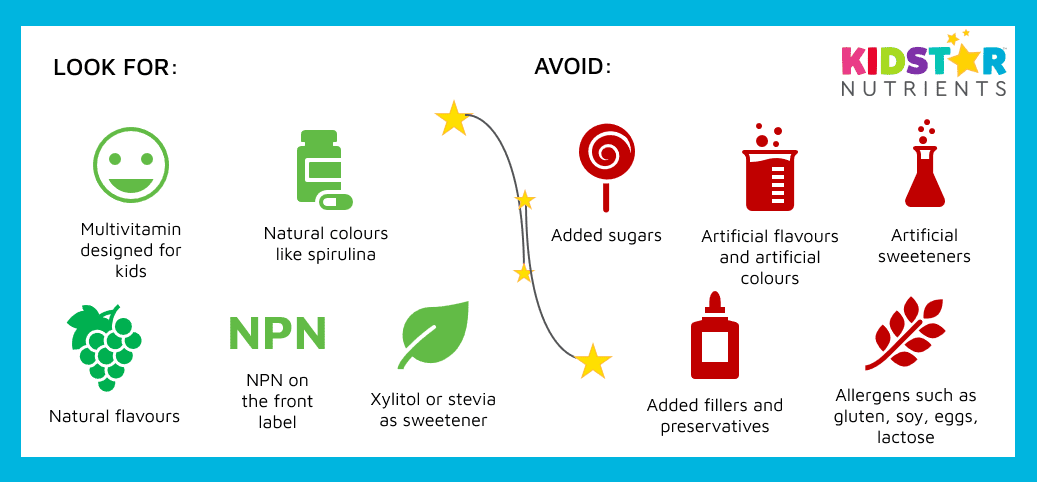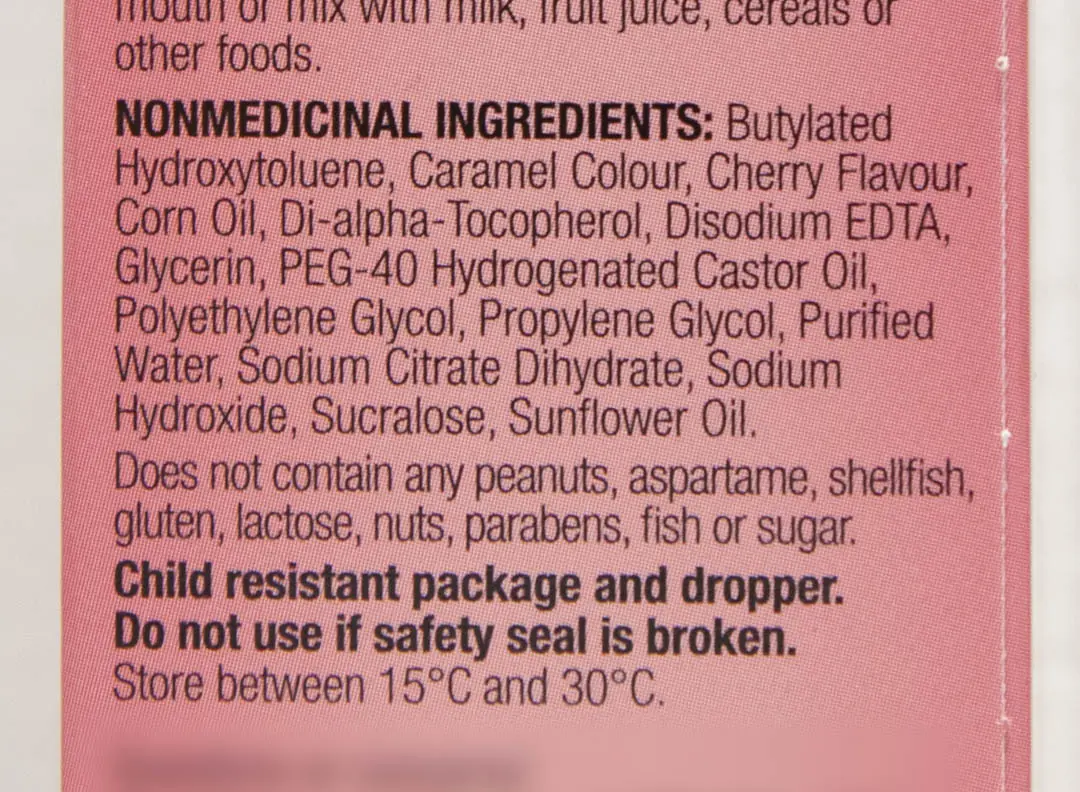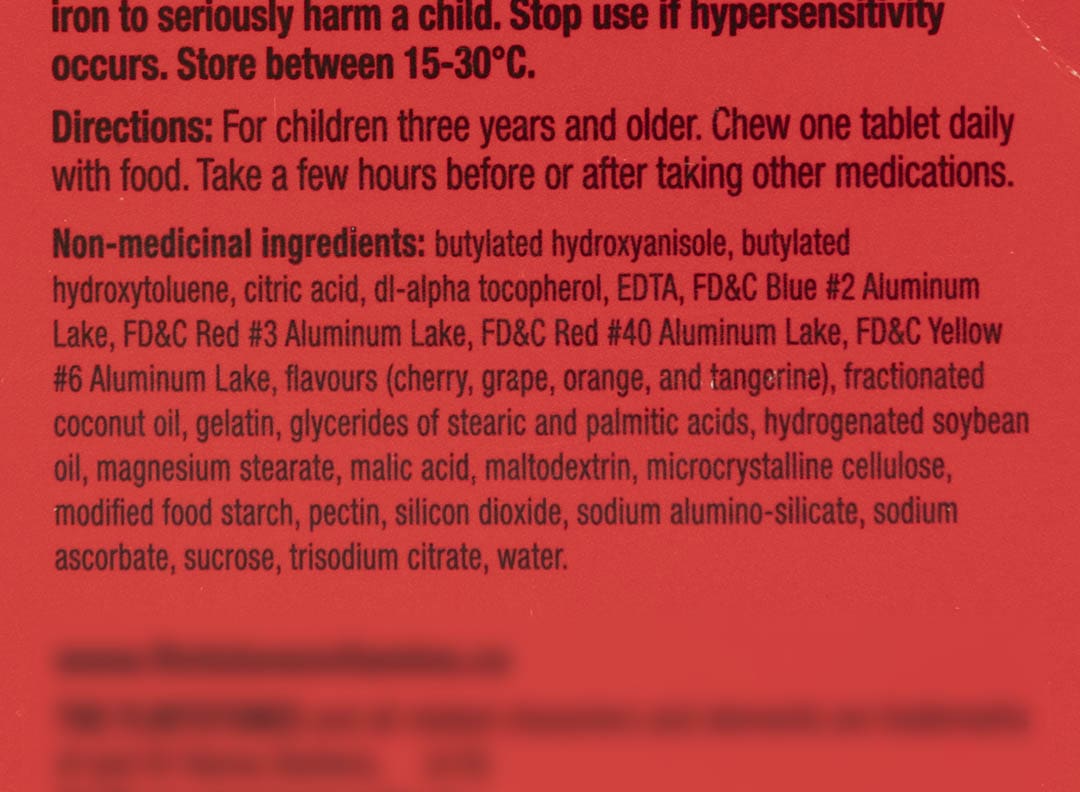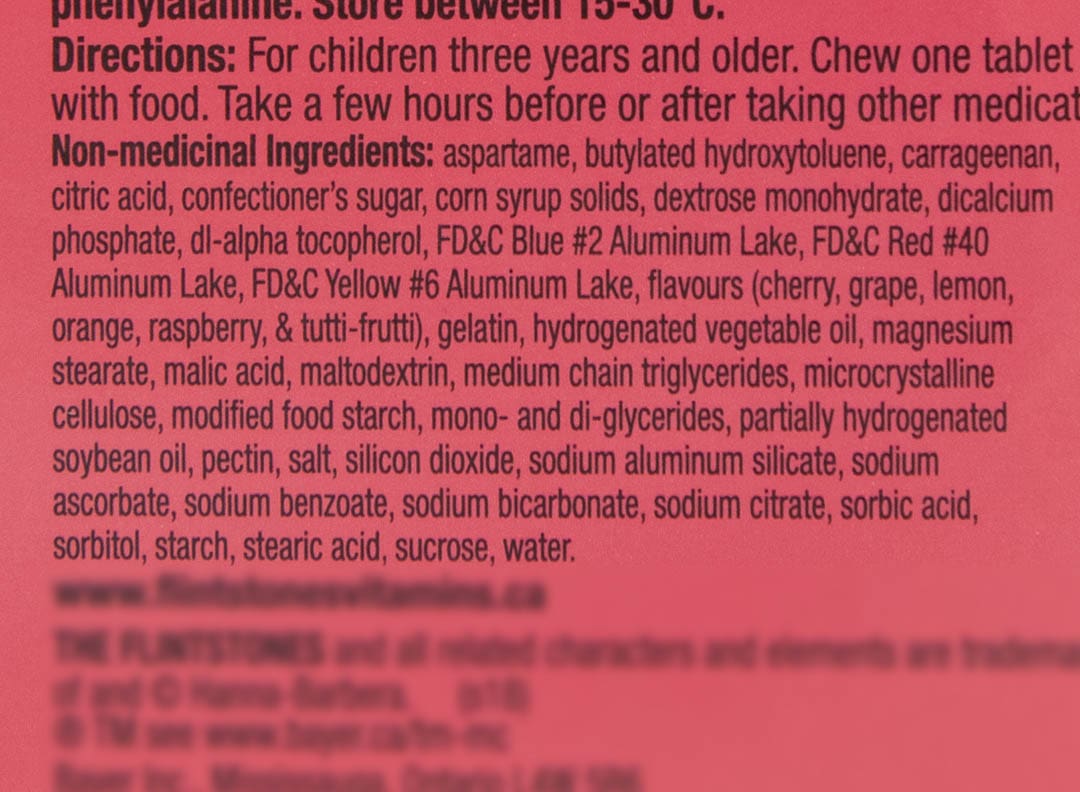What to Look for in Kids’ Multivitamins

By Caitlyn Vanderhaeghe, B.A., B.Ed.
The answer is yes. (Read more about why kids need multivitamins.)
According to the clinical research that has evaluated what our kids are eating, it is very difficult to ensure your child is getting the daily requirement of nutrients necessary for optimal growth and development from our North American diet. The most common nutritional deficiencies in Canadian children are iron, vitamin D, calcium, and fiber.
Nutritional supplements are designed to supplement the diet. Think of them as an insurance policy for the days when your child is not eating the foods you know they should. Providing a quality multivitamin with mineral supplements for your child is important to help fill in the nutritional gaps.
Reasons why your child can’t get enough nutrients from food:
- Foods are grown in soil that lacks nutrients due to over-farming.
- Fruits and vegetables are harvested under-ripe and shipped long distances which causes lower nutrient content.
- You have a picky eater who is eating an inadequate intake of vegetables, fruit, protein, and healthy fats.
- Consuming too many processed foods.
- Eating sugary or salty foods, which cause the depletion of potassium and other important nutrients.
- Your child has digestion issues which can cause poor absorption.
- Kids just don’t eat enough when they are small to get adequate nutrients even if you are eating a healthy diet.
Look for the following key items when choosing a multivitamin with mineral supplement for children:
A Multivitamin Formulated Specifically for Children
Adult multivitamins with minerals are designed for someone who is over 100 pounds. Too much of certain vitamins and minerals can be harmful to children.
Too many kids’ nutritional supplements are providing only a tiny dose of a nutrient when your child should be getting the appropriate amount for their age. It is not enough to have a long list of nutrients in the formula. A good quality nutritional supplement will provide the optimal dose of each ingredient.

Look at the Form of the Nutrient
The form or type of nutrient is also important. For example, you will see a mineral on the label listed with its name like magnesium, but the label should also list what form of magnesium. And there are several forms of magnesium, i.e., magnesium glycinate, magnesium citrate, magnesium sulfate, magnesium carbonate. There is a big difference in the action and absorption between different forms of the nutrient. The best form of magnesium would be magnesium glycinate as it is gentle on the digestive system (does not cause diarrhea like the other forms do) and it is better absorbed. Your supplement should always state the form of the nutrient. The best forms of some nutrients include calcium as an ascorbate, vitamin K2 in the MK7 form, selenium in the form of selenomethionine.
The chart below lists the dosages recommended for children aged 2 to 12 years or children under 100 lbs (45 kg). At 100 pounds or above, children can move to a multivitamin with minerals designed for adults.
,
| Nutrient Forms | Helps Support | Optimal Dosage |
| Vitamin A Beta Carotene Provitamin A |
Infection fighting, vision, immune function, respiratory health, blood sugar and insulin | 1000 IU (600 mcg) |
| Vitamin D3 in the form of cholecalciferol | Calcium absorption, builds strong bones and immune health, prevents colon cancer, reduces muscle cramps | 400 IU – 1000 IU |
| Vitamin E natural d-alpha in the form of tocopheryl succinate | For heart health, blood sugar regulation, immune health | 25 IU |
| Vitamin C in the form of calcium ascorbate | Cardiovascular and immune health, antiviral, antibacterial, optimal blood sugar regulation | 200 mg |
| Vitamin B1 in the form of thiamine | Needed for energy production, essential for a healthy nervous system, heart, and brain | 5 mg |
| Vitamin B2 in the form of riboflavin | Needed for healthy eyes, skin, hair, and nails | 5 mg |
| Vitamin B3 as niacin | Needed by the body to break down and use fats, carbohydrates, and proteins | 5 mg |
| Vitamin B6 in the form of pyridoxal hydrochloride | Immune and cardiovascular health, helps to produce red blood cells | 5 mg |
| Vitamin B12 in the form of methylcobalamin | Prevents anemia, supports mental health | 15 mcg |
| Folic acid (folate), 5-methylfolate (5-MTFH) or folinic acid | Prevents anemia, needed for digestion, serotonin, and cellular repair | 100 mcg |
| Vitamin K2 in the form of MK-7 (menaquinone-7) | Healthy heart and bones | 5 mcg |
| Vitamin B5 in the form of calcium D-pantothenate | Helps the body deal with stress. Supports skin, nerves, and adrenal glands | 10 mg |
| Calcium in the form of citrate | Healthy bones, nervous system, and energy | 130 mg |
| Biotin | Involved in tissue formation, involved in fat production | 10 mcg |
| Iron pyrophosphate | Prevents and treats iron deficiency anemia. Brain and emotional development. | 5 mg |
| Magnesium in the form of bisglycinate | Aids muscle function, nervous system, sleep, bone loss, blood sugar control | 65 mg |
| Inositol | Helps protect against free radical damage | 5 mg |
| Zinc in the form of citrate | Prevents colds and flu, reduces acne, for a strong immune system | 3 mg |
Vitamin A Beta Carotene Provitamin A
Helps support: Infection fighting, vision, immune function, respiratory health, blood sugar and insulin
Optimal dosage: 1000 IU (600 mcg)
Vitamin D3 in the form of cholecalciferol
Helps support: Calcium absorption, builds strong bones and immune health, prevents colon cancer, reduces muscle cramps
Optimal dosage: 400 IU – 1000 IU
Vitamin E natural d-alpha in the form of tocopheryl succinate
Helps support: For heart health, blood sugar regulation, immune health
Optimal dosage: 25 IU
Vitamin C in the form of calcium ascorbate
Helps support: Cardiovascular and immune health, antiviral, antibacterial, optimal blood sugar regulation
Optimal dosage: 200 mg
Vitamin B1 in the form of thiamine
Helps support: Needed for energy production, essential for a healthy nervous system, heart, and brain
Optimal dosage: 5 mg
Vitamin B2 in the form of riboflavin
Helps support: Needed for health eyes, skin, hair, and nails
Optimal dosage: 5 mg
Vitamin B3 as niacin
Helps support: Needed by the body to break down and use fats, carbohydrates, and proteins
Optimal dosage: 5 mg
Vitamin B6 in the form of pyridoxal hydrochloride
Helps support: Immune and cardiovascular health helps to produce red blood cells.
Optimal dosage: 5 mg
Vitamin B12 in the form of methylcobalamin
Helps support: Prevents anemia, supports mental health
Optimal dosage: 15 mcg
Folic acid (folate) 5-methylfolate (5-MTHF) or folinic acid
Helps support: Prevents anemia, needed for digestion, serotonin, and cellular repair
Optimal dosage: 100 mcg
Vitamin K2 in the form of MK-7 (menaquinone-7)
Helps support: Healthy heart and bones
Optimal dosage: 5 mcg
Vitamin B5 in the form of calcium D-pantothenate
Helps support: Helps the body deal with stress. Supports skin, nerves and adrenal glands
Optimal dosage: 10 mg
Calcium in the form of citrate
Helps support: Healthy bones, nervous system, and energy
Optimal dosage: 130 mg
Biotin
Helps support: Involved in tissue formation, involved in fat production
Optimal dosage: 10 mcg
Iron pyrophosphate
Helps support: Prevents and treats iron deficiency anemia; brain and emotional development
Optimal dosage: 5 mg
Magnesium in the form of bisglycinate
Helps support: Aids muscle function, nervous system, sleep, bone loss, blood sugar control
Optimal dosage: 65 mg
Inositol
Helps support: Helps protect against free radical damage
Optimal dosage: 5 mg
Zinc in the form of citrate
Helps support: Prevents colds and flu, reduces acne, for a strong immune system
Optimal dosage: 3 mg
Non-Medicinal Ingredients
Some non-medicinal ingredients are good for our kids like fruits and vegetable blends as they add fiber and additional nutrients. But other non-medicinal ingredients are not. Take note of the non-medicinal ingredients when looking at the label. Many non-medicinal ingredients should not be in your child’s nutritional supplements including artificial colours, flavours, sweeteners, and sugar.
Other potentially dangerous non-medicinal ingredients are the fillers, binders, and flowing agents used to make tablets hard or to fill up capsules or make liquids thick or stable. This includes but is not limited to sodium benzoate which is a preservative; glues and gums to keep ingredients together to make a tablet. To learn more about the non-medicinal ingredients found in your child’s nutritional supplements read, Black Hole Ingredients: What You Won’t Find in KidStar® Nutrients.

AVOID: Artificial Colours and Flavours
Sadly, most commercially produced children’s multivitamins and minerals are often loaded with artificial flavours, colours, and sweeteners. Put the nutritional supplement back on the shelf if it contains ‘artificial colour’ or ‘colours’. Canada does not currently require the specific type of artificial food colouring to be listed on the label, i.e., FD&C Red No. 40 number. We will have to wait until December 14, 2021, when companies will be required to list the type of artificial colour included in your child’s supplements.
Artificial flavours have been shown to cause behaviour and mood disorders like Attention Deficit Hyperactivity Disorder (ADHD) and tantrums in some children. As well, these artificial flavours have been linked to genetic damage and have potential cancer-causing actions.
LOOK FOR: Natural Colours and Flavours
There is no reason to use artificial sweeteners, colours, or flavours in a child’s nutritional supplement because there are great natural ingredients derived from fruit, vegetables, and plants that are safe to use and may add nutritional benefit.
Natural food colourings come from fruits, vegetables, and herbs such as beetroot, turmeric, or spirulina.
AVOID: Added Sugars and Artificial Sweeteners
Dental decay and mood disorders are known side effects of consuming sugar. It seems counterproductive to give your child something containing sugar. Consuming sugar can inhibit or block the absorption of vitamin C, vitamin D3, and magnesium.
Sugar can come in many forms, so look for the following on labels: sugar, fructose, glucose, sucrose, dextrose, lactose, high fructose corn syrup, corn syrup, cane syrup/juice, or tapioca syrup. Some supplements include multiple forms of sugar in the same product. Avoid vitamin and mineral supplements containing sugar.
Artificial sweeteners are chemicals that ignite the taste buds on your tongue sending signals to your brain that you are eating sweet foods. Sucralose, saccharin, aspartame, acesulfame potassium are a few to avoid in your child’s nutritional supplements. Artificial sweeteners can disrupt healthy gut bacteria and are not recommended for children. Some artificial sweeteners available in North America are not approved for consumption in other countries.
LOOK FOR: Natural Sweeteners
Xylitol for Strong Healthy Teeth
A good natural alternative to sugar is xylitol, a sugar alcohol made from birch trees or non-GMO corn cobs. Xylitol is also naturally found in varying amounts in some fruits and vegetables like strawberries, raspberries, mushrooms, and cauliflower. Our body can also naturally make xylitol during the metabolism of the carbohydrates we eat. It tastes sweet like sugar, but studies have found it helps prevent tooth decay and remineralizes dental cavities. Xylitol has minimal effects on blood sugar or insulin levels making it safe for diabetics or those with prediabetes.
Stevia Super Sweet
Stevia, a sweetener extracted from the leaves of the stevia rebaudiana plant, is another excellent natural sugar alternative to look for. Stevia extract is 300 times sweeter than sugar but contains zero calories. A tiny amount provides a strong sugar taste, so you do not need much! The better the quality of the stevia the more it tastes like sugar without any aftertaste. Stevia has been found to lower blood sugar levels in diabetics. This plant is being studied for its ability to protect our arteries from plaque build-up and normalize high blood pressure too.
AVOID: Allergens
Soy, gluten, eggs, lactose, nuts, milk, tree nuts, peanuts, shellfish, and wheat are very common allergens for many children. These foods cause digestive upsets, hives, rashes, respiratory problems, and even anaphylactic shock. So, avoid these.
LOOK FOR: Allergen-Free
Companies that manufacture nutritional supplements, so they are free of common allergens, including genetically modified ingredients, care about your child’s health.
Examples of Ingredients to Avoid:
The following labels list non-medicinal ingredients that should not be in a child’s nutritional supplement. The supplements below are packed full of unnecessary and potentially harmful additives. Two of the below come from children’s multivitamins made by a very popular supplement brand, and one are vitamin D drops for babies. (Click image to zoom.)
| What to look for |
| Multivitamin designed for kids |
| Dosages that are appropriate |
| Xylitol or stevia as a sweetener |
| Natural colours and flavours |
| Natural preservatives or binders such as potato starch or citric acid |
| An NPN (Natural Product Number) showing Health Canada has approved it |
| What to avoid |
| Added sugars like glucose, fructose |
| Artificial sweeteners like aspartame |
| Preservatives such as BHT and sodium benzoates |
|
Fillers and flowing agents like carrageenan |
| Artificial flavours and artificial colours such as tartrazine or sunset yellow |
| Allergens such as gluten, soy, eggs, lactose (dairy), nuts, wheat |
Find kids’ multivitamins here
Complete multi vitamin and mineral formula with the highest quality essential nutrients.
StarMulti®
$34.99
Loaded with essential vitamins, minerals, and omega-3 fatty acids
Star Bundle
$81.14
(Save 15%)
References

About the Author
Caitlyn Vanderhaeghe, B.A., B.Ed., is a health advocate, licensed teacher, and CEO of KidStar Nutrients. Caitlyn’s experience spans more than a decade of supply chain and ingredients sourcing in the natural products industry. As a mother of three daughters, Caitlyn’s mission is to help educate parents about kids’ nutrition and provide clean nutrients for kids and families.



